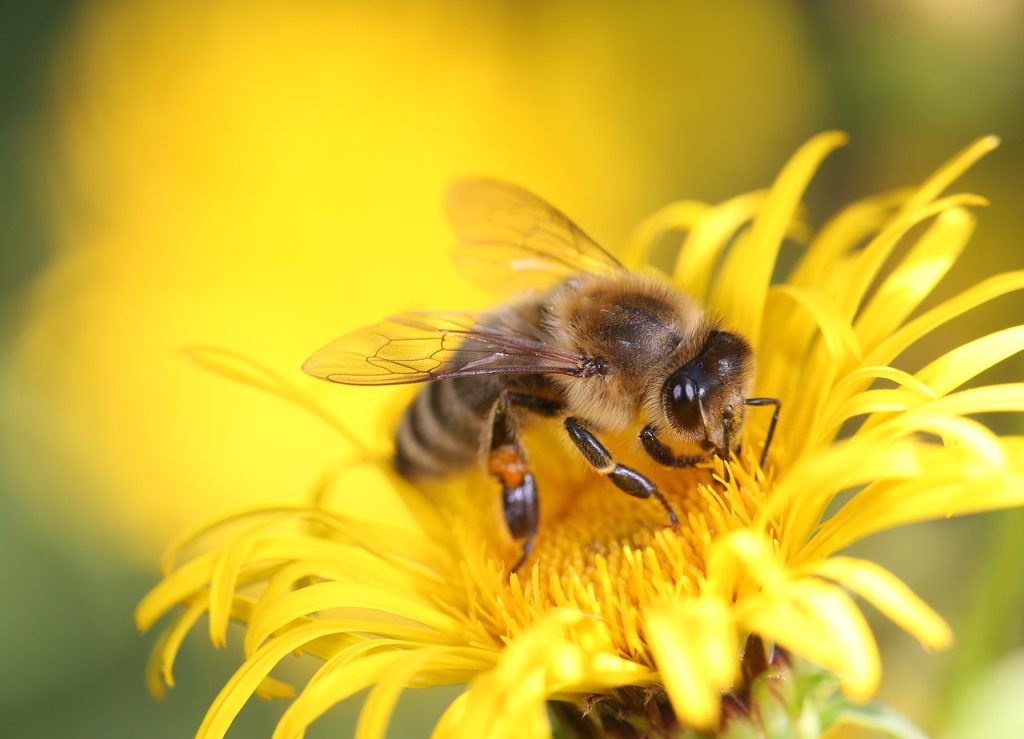An engineered food supplement, designed to provide essential compounds found in plant pollen, was found to significantly enhance colony reproduction. The results have been published today in the journal Nature.
Climate change and agricultural intensification have increasingly deprived honeybees of the floral diversity they need to thrive. Pollen, the major component of their diet, contains specific lipids called sterols necessary for their development. Increasingly, beekeepers are feeding artificial pollen substitutes to their bees due to insufficient natural pollen. However, these commercial supplements – made of protein flour, sugars, and oils – lack the right sterol compounds, making them nutritionally incomplete.
In the new study, carried out in collaboration with Royal Botanic Gardens Kew, University of Greenwich, and the Technical University of Denmark, the research team succeeded in engineering the yeast Yarrowia lipolytica to produce a precise mixture of six key sterols that bees need. This was then incorporated into diets fed to bee colonies during three-month feeding trials. These took place in enclosed glasshouses to ensure the bees only fed on the treatment diets.
By the end of the study period, colonies fed with the sterol-enriched yeast had reared up to 15 times more larvae to the viable pupal stage, compared with colonies fed control diets. Colonies fed with the enriched diet were more likely to continue rearing brood up to the end of the three-month period, whereas colonies on sterol-deficient diets ceased brood production after 90 days. Notably, the sterol profile of larvae in colonies fed the engineered yeast matched that found in naturally foraged colonies, suggesting that bees selectively transfer only the most biologically important sterols to their young.

Professor Geraldine Wright
Professor Wright, who heads up the Oxford Bee Lab in the Department of Biology at Oxford and was senior author of the Nature paper, said, “Our study demonstrates how we can harness synthetic biology to solve real-world ecological challenges. Most of the pollen sterols used by bees are not available naturally in quantities that could be harvested on a commercial scale, making it otherwise impossible to create a nutritionally complete feed that is a substitute for pollen.”
Lead author Dr Elynor Moore (Department of Biology, University of Oxford at the time of the study, now Delft University of Technology) added: “For bees, the difference between the sterol-enriched diet and conventional bee feeds would be comparable to the difference for humans between eating balanced, nutritionally complete meals and eating meals missing essential nutrients like essential fatty acids. Using precision fermentation, we are now able to provide bees with a tailor-made feed that is nutritionally complete at the molecular level.”

Pollinators like honeybees contribute to the production of over 70% of leading global crops. Severe declines – caused by a combination of nutrient deficiencies, climate change, mite infestations, viral diseases, and pesticide exposure – poses a significant threat to food security and biodiversity. For instance, over the past decade, annual commercial honey bee colony losses in the U.S have typically ranged between 40 and 50%, and could reach 60 to 70% in 2025. This new engineered supplement offers a practical means to enhance colony resilience without further depleting natural floral resources. Since the yeast biomass also contains beneficial proteins and lipids, it could potentially be expanded into a comprehensive bee feed.
Whilst these initial results are promising, further large-scale field trials are needed to assess long-term impacts of the food on honeybee health, but the supplement could be available to farmers within two years.
This new technology could also be used to develop dietary supplements for other pollinators or farmed insects, opening new avenues for sustainable agriculture.
The study ‘Engineered yeast provide rare but essential pollen sterols for honeybees’ has been published in Nature.
With thanks to the University of Oxford who first published this article. For the full article and further information, please click here.